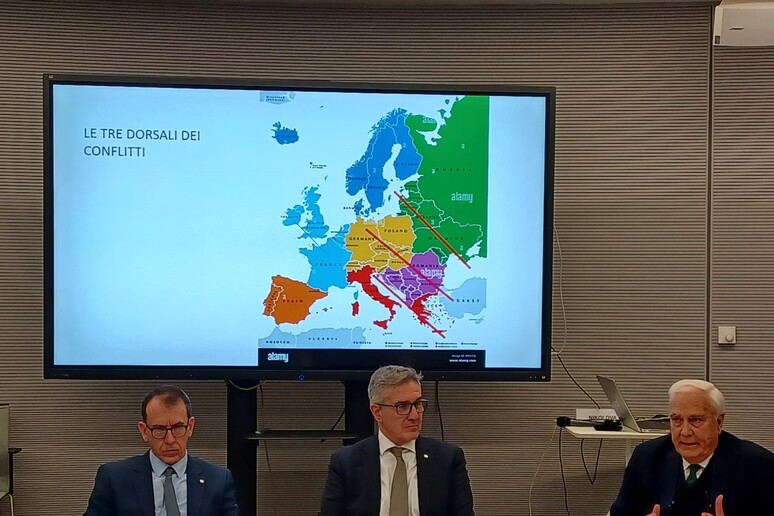Italy, to carve out a significant
space from an economic and entrepreneurial point of view In the
crucial area of the Western Balkans, must increasingly network
and act as a "system," avoiding being crushed by competitors
that are becoming systemic, such as Russia and China.
Therefore, the Italian and FVG companies interested in this
area must be supported above all in terms of business and
investment security, given the ongoing geopolitical changes.
This message was launched at the meeting aimed particularly
at entrepreneurs from the Northeast, held in Udine in the
Pordenone-Udine Chamber of Commerce, organized by the Atlantic
Club of Triveneto, an affiliate of the National Atlantic
Committee, to explore the impact of the new geopolitical
dynamics on the Balkans.
Keynote speakers were Marco Ferruzzi Balbi, president of the
Triveneto Atlantic Club; Fabrizio Luciolli, president of the
Italian Atlantic Committee and senior advisor to the Ministry of
Defense; and Arduino Paniccia, president of the Venice School of
Economic Warfare and International Competition. Several
entrepreneurs from the northeastern area were in the audience.
"The Balkans are a meeting point where instability arrives
from different directions, fueled by strong interests of
systemic competitors such as Russia and China - said Luciolli -,
and recently also Turkey, which, not respecting EU rules for
workers' rights, civil and democratic freedoms, manage to gain
economic advantages by making alliances with some local leaders.
This is what happened in Serbia and will probably happen in
North Macedonia on May 24, and this also risks slowing down or
setting back that process of European integration of those same
countries." Italy, according to Luciolli, "is at the heart of
this dynamic and has an important interest in the Western
Balkans being stable." The EU, too, the expert said, "has
rekindled its attention to the area and was recently in both
Skopje and Sarajevo to revive the prospect of a membership bid
for these countries and create a regional market that can then
integrate with the European one." A process financed with
substantial funds, he remarked, because we are talking about 6
billion to be disbursed globally, 2 billion of which are
available in the immediate term.
The president of the Triveneto Atlantic Club, Marco Ferruzzi
Balbi, was the one who outlined the goals of the nonprofit
association, the first of which is to support businesses on
security. "If I want to open a plant in Belgrade, I have to make
a security plan according to our standards," he explained, "and
I'm talking about safety, but also cybersecurity for data and
guarantees for business. We can do for a business a country risk
assessment document by people who are experts there, and that is
a big advantage."
Arduino Paniccia underlined that "a new strategy is needed
for the Balkan area, first and foremost a European one, and
certainly, the EU and NATO remain defensive pillars, but to
counter the economic advance of the pro-Russian and pro-Chinese
component, we must create, starting from the central role of
Udine, FVG and the Northeast, a strategy based upon concrete
synergies between entrepreneurs. However, to face an economic
war that will continue with no holds barred, we need to
rediscover some keywords: rationality, alliances, realpolitik,
strategic arrangement."
ALL RIGHTS RESERVED © Copyright ANSA





